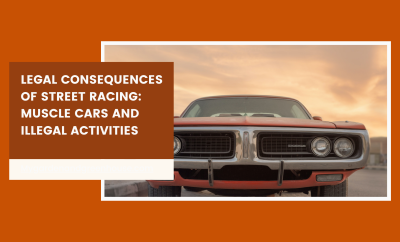[ad_1]
Understanding Street Racing
Street racing refers to the act of driving high-performance vehicles at excessive speeds on public roads, often in an organized and competitive manner. It typically involves two or more drivers who engage in a race to determine the fastest car. Street racing can occur on public streets, highways, or even secluded areas. Participants may modify their vehicles to enhance speed and performance, putting themselves and others at great risk.
The Rise of Muscle Cars in Street Racing
Muscle cars, with their powerful engines and sleek designs, have become synonymous with street racing culture. The allure of these high-performance vehicles, such as the iconic Ford Mustang, Chevrolet Camaro, and Dodge Challenger, has attracted enthusiasts seeking thrills on the open road. The combination of raw power and aesthetic appeal makes muscle cars a popular choice among street racers.
Laws and Regulations Governing Street Racing
Street racing is illegal in most jurisdictions around the world. Local laws and regulations differ, but they generally prohibit racing on public roads due to the inherent dangers it poses to public safety. These laws are in place to protect both the racers themselves and innocent bystanders who may be affected by reckless driving.
Veteran personal injury lawyer Darryl M.. Breaux said, “Street racing carries severe legal consequences, including criminal charges, civil lawsuits, and financial responsibility for damages.” He strongly advises against participating in this dangerous activity
Criminal Charges and Penalties
Individuals caught street racing can face various criminal charges, depending on the jurisdiction and circumstances of the offense. These charges may include reckless driving, speeding, exhibition of speed, vehicular manslaughter, or even homicide if someone is killed as a result of the illegal race. Penalties for these offenses can range from fines and license suspension to imprisonment, particularly in cases involving injury or death.
Civil Liability and Financial Consequences
Apart from criminal charges, street racers can also face civil lawsuits filed by individuals who suffer injuries or property damage as a result of the illegal race. The at-fault racer may be held financially responsible for medical expenses, property repairs, and other losses incurred by the victims. These civil liabilities can result in substantial financial consequences and have long-lasting effects on the racers’ lives.
Vehicle Impoundment and Forfeiture
Law enforcement agencies often have the authority to impound and seize vehicles used in street racing activities. Depending on local laws, the confiscated vehicle may be subject to forfeiture, meaning the racer may permanently lose their car. Vehicle impoundment and forfeiture serve as additional deterrents to discourage individuals from participating in street racing.
Driver’s License Suspension and Revocation
Engaging in street racing can lead to the suspension or revocation of a driver’s license. Authorities take such measures to prevent repeat offenses and to protect public safety. License suspension can range from a few months to several years, while license revocation entails a complete loss of driving privileges. Reinstating a suspended or revoked license often requires completion of driver education programs or meeting other specific requirements.
Criminal Record and Future Consequences
Individuals convicted of street racing offences may acquire a criminal record, which can have significant consequences for their future. A criminal record can impact employment opportunities, educational pursuits, and even personal relationships. Background checks conducted by employers and educational institutions often reveal such convictions, potentially leading to negative outcomes for those involved in illegal street racing.
Street Racing and Insurance Coverage
Participating in street racing can have severe implications for insurance coverage. Insurance companies may deny claims for damages resulting from street racing incidents, considering it a breach of policy terms. Furthermore, insurance premiums can significantly increase for individuals involved in street racing, making it costly and challenging to obtain coverage in the future.
Efforts to Combat Street Racing
Authorities and communities are taking steps to combat street racing and raise awareness about its dangers. Police departments conduct targeted operations to apprehend street racers and enforce traffic laws rigorously. Additionally, community outreach programs, public service announcements, and educational campaigns aim to educate the public, especially young drivers, about the consequences of illegal street racing.
Public Safety Concerns
Street racing poses severe threats to public safety. The high speeds involved can result in loss of vehicle control, leading to accidents that endanger the lives of racers, passengers, and innocent bystanders. Additionally, the presence of unauthorized spectators and the lack of proper safety measures further exacerbate the risks associated with street racing events.
The Role of Law Enforcement
Law enforcement agencies play a crucial role in curbing street racing activities. They employ various tactics, such as increased patrols, undercover operations, and surveillance to identify and apprehend street racers. By enforcing traffic laws and imposing penalties, law enforcement aims to deter individuals from engaging in illegal street racing and protect public safety.
Alternative Legal Racing Options
Recognizing the allure of racing culture, some jurisdictions have established legal alternatives for enthusiasts. These include sanctioned racing events at professional racetracks, drag strips, or closed circuits where drivers can showcase their skills in a controlled and safe environment. Encouraging legal racing options provides an outlet for adrenaline junkies while reducing the need for illegal street racing.
Community Awareness and Education
Educating communities about the dangers and consequences of street racing is vital in curbing this illegal activity. Schools, community centers, and local organizations can collaborate to organize awareness campaigns, inviting law enforcement officers and professionals to share their experiences and knowledge. Through education, the community can work together to discourage street racing and promote responsible driving habits.
FAQs (Frequently Asked Questions)
Is street racing always illegal?
Yes, street racing is illegal in most jurisdictions due to the inherent dangers it poses to public safety.
What are the potential criminal charges for street racing?
Depending on the circumstances, street racing charges can include reckless driving, speeding, exhibition of speed, or vehicular manslaughter.
Can insurance cover damages from street racing incidents?
Insurance companies may deny claims for damages resulting from street racing incidents, considering it a breach of policy terms.
How can communities combat street racing?
Communities can combat street racing through education, awareness campaigns, increased law enforcement efforts, and the promotion of legal racing alternatives.
What are the long-term consequences of a criminal record from street racing?
A criminal record resulting from street racing can impact future employment, education, and personal relationships, leading to negative consequences.
Conclusion
Street racing may seem thrilling and exhilarating, but it comes with severe legal consequences. Engaging in illegal racing activities can result in criminal charges, civil liabilities, vehicle impoundment, driver’s license suspension, and a tarnished reputation.
Furthermore, street racing jeopardizes public safety and puts lives at risk. It is crucial for individuals to understand the gravity of these legal consequences and consider safe and legal alternatives to satisfy their need for speed.
VN:F [1.9.22_1171]
VN:F [1.9.22_1171]


